|
|
Wladyslaw Szpilman |
|
|
STOP/PLAY |
Los Angeles Times Bestsellers List
The Best Books of 1999 - BEST NONFICTION OF 1999
THE PIANIST; By Wladyslaw Szpilman; Picador
'The Pianist,' Wladyslaw Szpilman's remarkable memoir of his survival in Warsaw between the years 1939 and 1945, is a significant contribution to the literature of remembrance, a document of lasting historical and human value. Unforgivably overlooked since its publication (in Polish) in 1946 and translated into English just now for the first time, the book is a relative rarity: an account of the Holocaust written in the immediate aftermath of the experience itself. It has all the rawness and specificity of horrors painfully and uncomprehendingly withstood and afterward just as uncomprehendingly --but necessarily-- recorded. Writing this book would seem to have been a further act of survival by a man who performed more of them in six years than most human beings do in a lifetime. At the center of this book is of the largest hows in all of human inquiry: how one people set about systematically and relentlessly annihilating another. It is a how that Szpilman tells with clarity, intelligence, candor, courage. It is the how that must be told again and again and again.
human value. Unforgivably overlooked since its publication (in Polish) in 1946 and translated into English just now for the first time, the book is a relative rarity: an account of the Holocaust written in the immediate aftermath of the experience itself. It has all the rawness and specificity of horrors painfully and uncomprehendingly withstood and afterward just as uncomprehendingly --but necessarily-- recorded. Writing this book would seem to have been a further act of survival by a man who performed more of them in six years than most human beings do in a lifetime. At the center of this book is of the largest hows in all of human inquiry: how one people set about systematically and relentlessly annihilating another. It is a how that Szpilman tells with clarity, intelligence, candor, courage. It is the how that must be told again and again and again.
There are many ways to read a book about the Holocaust, and one of them, surely, inevitably, is to try to answer the unanswerable: What makes one man endure when so many others succumb? We can only learn from those who testify; the others of course are mute. From Szpilman's testimony we learn this: It is an ineffable and wholly unpredictable mixture of fate, determination, accident, instinct. To know Wladyslaw Szpilman is, in the most hopeless of contexts, to know a modicum of hope. L.A.Times Sunday Book Review, December 5, 1999
The Sunday Times
Three personal favourites just make it into this category. In a year of glorious books, the one which made the deepest impression on me was the shortest, Wladyslaw Szpilman's The Pianist (Phoenix), which tells how, hidden in an attic, he survived the destruction of the Jewish ghetto in Warsaw. It is republished together with the diary of Wilm Hosenfeld, the German officer who saved his life. Szpilman's memoir haunts the mind in tiny, searing cameos; a rich guest in a cafe asks the pianist to stop playing so that he can test the ring of his gold coins on a table; Szpilman's father, a violinist, bows to every German officer he can find, bemusing them with his smiling courtesy; pushed to one side as his family are hustled onto a death-truck, Szpilman hears the sound behind closed windows, "the twittering of caged birds in deadly peril". You'll cry - I did - but please read it. by MIRANDA SEYMOUR London, 28.11.1999
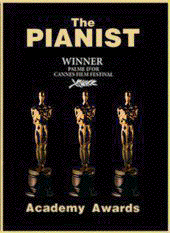
Adrien Brody accepting the Oscar Award:
..."This film would not be possible without the blueprint provided by Wladyslaw Szpilman. This is a tribute to his survival"...

CANNES -- The jury at the 55th Cannes International Film Festival awarded its top prize (Palme d`Or) tonight to Roman Polanski for "The Pianist."
PARIS -- Roman Polanski's "The Pianist" won seven Cesars, including best picture and director...
LONDON -- On a night when no film won more than two prizes, the big winner at the British Academy Film Awards was "The Pianist," which picked up best film and best director for Roman Polanski.
HOLLYWOOD -- Best Actor, Best Director and Best adapted sreenplay - 3 Academy Awards (75th Oscars 2003) for The Pianist.
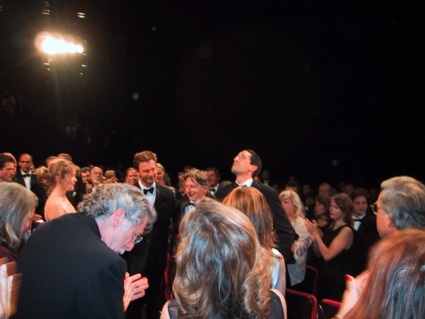
![]() MORE PICTURES IN THE PHOTOGALLERY
MORE PICTURES IN THE PHOTOGALLERY ![]()
![]()
![]()
Son Aims to Preserve Szpilman's Legacy
Wed December 25, 2002
HOLLYWOOD (Variety) – By Phil Gallo
It's a fleeting scene in "The Pianist," a three-second take in which Wladyslaw Szpilman is seen seated at the piano, penciling in notation on a musical staff. He is doing what he had quite a reputation for doing, even before World War II: composing. Roman Polanksi's Dec. 27 release chronicles Szpilman's harrowing days in Poland eluding Nazis, concentrating on his prowess as an interpreter of Chopin, usually for Poland's national radio. It never mentions his career as a songwriter, penning ditties that would become standards in the country before World War II and for more than two decades afterward. Szpilman stopped recording in 1968 and wrote his last songs in 1973. He died in 2000 at the age of 88. His son, Andrzej, has made it his mission to see that his father's music survives. He 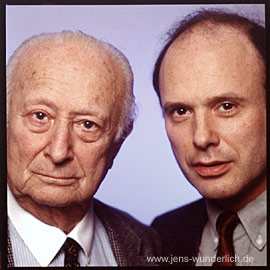 plans to introduce the elder Szpilman's work to Western audiences, starting with a new recording of his father's songs with English-language lyrics. He held an audition to find a singer and, after trying out about 30 vocalists, settled on Canada's Wendy Lands; lyricists were commissioned to put the elder Szpilman's works into the new language. The result is the obviously titled "Wendy Lands Sings the Music of the Pianist Wladyslaw Szpilman." Universal's Hip-O Records came on board after Andrzej Szpilman had completed four of the tunes with Lands and producer John Leftwich. Although the album was released Nov. 26, the promotional push is being tied to the release of "The Pianist" film. (Sony's soundtrack album also was released Nov. 26.) Few scripted films about real musicians have spawned non-soundtrack albums - Robert Altman's "Kansas City" comes to mind -- which makes this venture unusual. Szpilman has grown concerned that since the fall of communism in Europe, the music publishing of the Eastern world never made the transition to the West the way classical music did. His father's classical music was performed in the U.S., and Szpilman toured the States beginning in the 1960s with the Warsaw Piano Quintet, but his 500 songs, 150 of which made their way onto Poland's pop charts, were unknown outside his home country. "My father's work was up to the work of Western composers, and the best way to get my father's music to Western (audiences) was through proper recordings with English lyrics," says Szpilman, who has been musical director for a rock group, a record producer and a dentist. "The Polish lyrics were too specific to Poland to translate." Szpilman pere often collaborated with Poland's leading poets, one of whom was his brother Henryk; his music was a favorite of Polish jazz musicians and several tunes were recorded 50 times or more, the younger Szpilman says. The new album is a thoroughly modern-sounding disc, akin to the work of Norah Jones or Rickie Lee Jones. Szpilman, a fan of Cole Porter, Duke Ellington and Burt Bacharach, drew on Western influences when writing pop music. "We were taken by the intimate nature of the album," says Hip-O VP Pat Lawrence, who brought the project to the label. Tracks from the album are being serviced to radio, though there is no specific single. The CD will be part of radio station giveaways associated with the screening of the film, and Lands will likely do showcase gigs in L.A. and New York, possibly touring if sales are strong enough. Lands, from Montreal, had a hit in Canada with "Can't Hold On," and over the last couple of years has landed tunes in TV shows ("Felicity," "Family Law") despite not having a domestic deal. Songs on the album were wholly revamped lyrically but unchanged musically. "I Wish You'd Ask to Dance With Me" was a hit in 1936 as "I Didn't Expect Your Tears"; "Fall in Love Again" was written in the Warsaw ghetto in 1940 as "Wherever You Are, Come Back"; and "My Memories of You" began life in 1948 as "Silent Night." Boosey & Hawkes will publish a songbook associated with the album, and a documentary on the pianist's life is being readied for U.S. television in 2004. "In just a few months," Szpilman says of the retelling of his father's story, "we'll cover an entire life that he never talked about."
plans to introduce the elder Szpilman's work to Western audiences, starting with a new recording of his father's songs with English-language lyrics. He held an audition to find a singer and, after trying out about 30 vocalists, settled on Canada's Wendy Lands; lyricists were commissioned to put the elder Szpilman's works into the new language. The result is the obviously titled "Wendy Lands Sings the Music of the Pianist Wladyslaw Szpilman." Universal's Hip-O Records came on board after Andrzej Szpilman had completed four of the tunes with Lands and producer John Leftwich. Although the album was released Nov. 26, the promotional push is being tied to the release of "The Pianist" film. (Sony's soundtrack album also was released Nov. 26.) Few scripted films about real musicians have spawned non-soundtrack albums - Robert Altman's "Kansas City" comes to mind -- which makes this venture unusual. Szpilman has grown concerned that since the fall of communism in Europe, the music publishing of the Eastern world never made the transition to the West the way classical music did. His father's classical music was performed in the U.S., and Szpilman toured the States beginning in the 1960s with the Warsaw Piano Quintet, but his 500 songs, 150 of which made their way onto Poland's pop charts, were unknown outside his home country. "My father's work was up to the work of Western composers, and the best way to get my father's music to Western (audiences) was through proper recordings with English lyrics," says Szpilman, who has been musical director for a rock group, a record producer and a dentist. "The Polish lyrics were too specific to Poland to translate." Szpilman pere often collaborated with Poland's leading poets, one of whom was his brother Henryk; his music was a favorite of Polish jazz musicians and several tunes were recorded 50 times or more, the younger Szpilman says. The new album is a thoroughly modern-sounding disc, akin to the work of Norah Jones or Rickie Lee Jones. Szpilman, a fan of Cole Porter, Duke Ellington and Burt Bacharach, drew on Western influences when writing pop music. "We were taken by the intimate nature of the album," says Hip-O VP Pat Lawrence, who brought the project to the label. Tracks from the album are being serviced to radio, though there is no specific single. The CD will be part of radio station giveaways associated with the screening of the film, and Lands will likely do showcase gigs in L.A. and New York, possibly touring if sales are strong enough. Lands, from Montreal, had a hit in Canada with "Can't Hold On," and over the last couple of years has landed tunes in TV shows ("Felicity," "Family Law") despite not having a domestic deal. Songs on the album were wholly revamped lyrically but unchanged musically. "I Wish You'd Ask to Dance With Me" was a hit in 1936 as "I Didn't Expect Your Tears"; "Fall in Love Again" was written in the Warsaw ghetto in 1940 as "Wherever You Are, Come Back"; and "My Memories of You" began life in 1948 as "Silent Night." Boosey & Hawkes will publish a songbook associated with the album, and a documentary on the pianist's life is being readied for U.S. television in 2004. "In just a few months," Szpilman says of the retelling of his father's story, "we'll cover an entire life that he never talked about."
Photo jens.wunderlich@t-online.de
"Charming, effervescent, and strikingly American"...
From Universal Records
in the USA, Japan, Australia the CD
SONGS COMPOSED BY
WLADYSLAW SZPILMAN

12 popular songs wonderfully performed by Wendy Lands
| ..."Pianist' getting an Oscar tune-up".. - USA Today, 8. Nov.2002 | |
| ..." A not to be taken lightly album " - Bilboard, 23. Nov. 2002 | |
| ..." This CD: pure love - and made with the same." - Die Zeit 51/02 | |
| ..."Charming, effervescent, and strikingly American.." - Bilboard 21.12.2002 | |
| ..."elegant and beautiful" | |
| ..." thoroughly modern-sounding disc " - Variety, 23.12.2002 | |
| ..."This CD is testament to the power of music..." - The Holywood Reporter, 7. 03.2003 | |
| ..."saddles up with two Joneses, Norah and Rickie Lee .. " - Variety, 14.03.2003 | |
| ..."marvelously uplifting quality. " - Los Angeles Times, 14.03.2003 | |
| ..."amazingly cool..." - The Holywood Reporter, 14. 03.2003 |
You could not hear this music on the radio? I guess there was no airplay for it. This CD was almost ignored by the radio stations.
SONGBOOK

“My memories of you”
Sixteen selected songs by Wladyslaw Szpilman
by Boosey & Hawkes Publishers
Some of Wladyslaw Szpilman's most popular songs from the 30s to the 70s have been recorded on the new disc "Wendy Lands Sing the Music of the Pianist Wladyslaw Szpilman". A selection of these timeless ballads are now published in their original version with piano accompaniment, for singers everywhere with newly commissioned English language lyrics by David Batteau, Michael Ruff, Carol Connor and others.
Learn about concert works by Wladyslaw Szpilman published by Boosey & Hawkes
Get Songbook "My memories of you" from Amazon.com
Hear Wladyslaw Szpilman playing his Concertino (1940) for Piano and Orchestra
(composed when the Warsaw Getto gates closed in 1940)
![]()
Army Archered - senior columnist, Just for Variety, on 20.2.2003
GOOD MORNING:
"THE PIANIST'S" ( WLADYSLAW SZPILMAN'S) music lives on -- with lyrics in English. I spoke with his son Andrzej (46) by phone from Germany where he is readying the publication of his father's songbook in three weeks. He had written more than 500 songs -- some of which Andrzej says he discovered written "on little bits of paper in coffee bars." Wladyslaw died July 6, 2000, when Roman Polanski was preparing to film "The Pianist." The songbook, published by Boosey and Hawkes will include English lyrics by Larry John McNally, David Batteau and Arthur Schlosser and Oscar-nominated (theme from "Rocky") Carol Connors. Her songs are titled, "Handle With Care" and "Lost Inside My Dream." Connors has something in common with the Szpilman family -- her Polish grandmother's entire family was murdered in Treblinka. Carol met with Andrzej in Hollywood last month and he returns in March to discuss names to record his father's songs with the English lyrics. I asked Andrzej his opinion of the film. "I am very grateful to Roman Polanski. It (the film) is a monument to all victims of the holocaust." As for his opinion on Adrien Brody, who portrays his father, "It was a great performance of a character so familiar to me. He was warm, great and I was very moved by him." Andrzej was present during the filming, his 10-year-old son played a role. He says Polanski avoided any personal publicity -- did not even have photographers around during his pre-filming meetings with Wladyslaw …
Now available from SONY CLASSICAL EUROPE
Wladyslaw Szpilman: Original recordings of the pianist
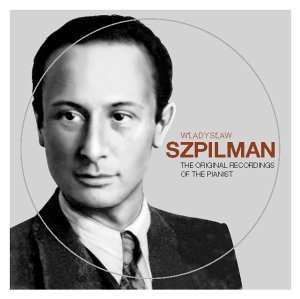
W. Szpilman plays works of Szpilman, Bach, Rachmaninow, Chopin a.o.
Buy this CD now from Amazon Germany, Amazon England Amazon France Amazon Japan
Some of the following CD´s with original recordings of the pianist - Wladyslaw Szpilman will be published soon by SONY Classical
1. Wladyslaw Szpilman - Solo Recordings.
2. Wladyslaw Szpilman & Bronislav Gimpel - Small Masterpieces for Violin and Piano. (Schubert, Bloch, Wieniawski, Kreisler, Bartok, Creston a.o.)
3. Wladyslaw Szpilman & Bronislav Gimpel - Violin Sonatas (Beethoven, Brahms, Franck, Grieg, Rathaus, Hindemith)
4. Wladyslaw Szpilman - Warsaw Piano Quintet (Brahms, Schumann, Dvorak, Franck, Zarebski, Shostakhovich)
THE PIANIST
WLADYSLAW SZPILMAN
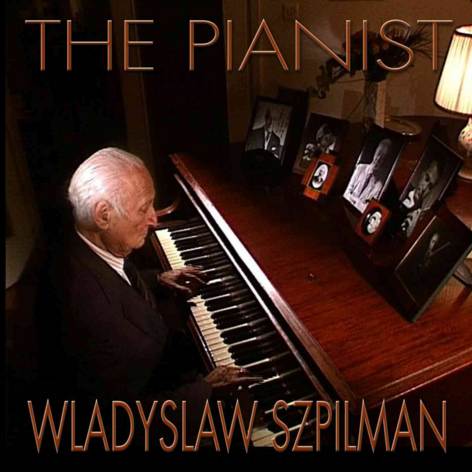
ORIGINAL RECORDINGS OF THE PIANIST W. SZPILMAN
Works of Bach Chopin and Szpilman
Now in the USA
Wladyslaw Szpilman plays Nocturne c sharp minor by F. Chopin
Link - Wladyslaw Szpilman plays Chopin (Quick Time Movie-Apple)
Link - Wladyslaw Szpilman plays Chopin (Real Audio High Quality-PC DSL )
Link Wladyslaw Szpilman plays Chopin (Real Audio PC Modem Connection)
Recorded 12/1997 in Warsaw ©A.Szpilman 2002, Cameraman J.Mazur
Independent, 14 August 2000
When the shells of the invading Nazis forced
the closure of Polish Radio on 23 September 1939, the last live
music heard was Wladyslaw Szpilman's performance of Chopin's C
sharp minor Nocturne. When broadcasting was resumed in 1945, it
was again Szpilman who initiated the transmissions, with the same
Chopin nocturne. (Around the same time, rather less high-mindedly,
BBC television resumed an interrupted Mickey Mouse cartoon.) What
happened to Szpilman in the interim formed the stuff of one of
the most harrowing of all accounts of Jewish life under the Nazis,
in a book published last year as The Pianist that immediately
climbed to the top of the international bestseller lists --- hardly
surprisingly: it is a compelling, harrowing masterpiece.
Szpilman wrote Death of a City (the initial title of his memoir) in 1945 more or less as therapy --- to put his memories down on paper and thus somehow to externalise them. In doing so he revealed that he was a masterly writer: his text matches a sharp eye for detail and for human character with a complete absence of 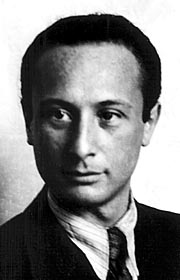 self-pity and of sanctimony.
self-pity and of sanctimony.
For the first two years of the occupation Szpilman played in the
bars and cafés that continued to open for business behind
the walls of the ghetto, sealed off from the rest of Warsaw on
15 November 1940. Szpilman records life there with dignity and
dispassion. He recalls watching the SS forcing a group of prisoners
out of a building:
They switched on the headlights of their car, forced their prisoners to stand in the beam, started the engines and made the men run ahead of them in the white cone of light. We heard convulsive screaming from the windows of the building, and a volley of shots from the car. The men running ahead of it fell one by one, lifted into the air by the bullets, turning somersaults and describing a circle, as if the passage from life to death consisted of an extremely difficult and complicated leap.
Time and again, chance dictated that Szpilman escape death. The end seemed finally to have come when he and his family were ordered to turn up at the Umschlagsplatz where, skirting the rotting corpses around them, they were to be herded onto trains headed for the gas chambers. Szpilman's last memory of his family is movingly understated:
At one point a boy made his way through the
crowd in our direction with a box of sweets on a string round
his neck. He was selling them at ridiculous prices, although heaven
knows what he was going to do with the money. Scraping together
the last of our small change, we bought a single cream caramel.
Father divided it into six parts with his penknife. That was our
last meal together.
But as the Szpilmans were being crammed onto
the train, one of the Jewish policemen grabbed Wladyslaw by the
collar, yanked him out of the throng and refused to let him through
to rejoin his family on the journey to death. Szpilman continued
to avoid death's clutches, surviving against all odds, often half-starved
and usually alone, hidden in obscure corners of bombed, burned
or empty buildings, intermittently helped by Polish friends risking
their own lives to bring him food or find him shelter: helping
a Jew automatically brought a death sentence. The strangest twist
in Szpilman's strange story came at its end: he was discovered
by a German officer who, after Szpilman had given proof of his
profession by playing that same C sharp minor Nocturne
on an abandoned piano, hid him and brought him food and an eiderdown
for warmth.
Not the least extraordinary aspect of Szpilman's book is the complete
lack of the indignation and anger that anyone writing immediately
after such years of hell might reasonably be expected to allow
himself. Yet even the grim vignettes of pointless death that are
studded through his text don't draw judgement --- perhaps because
none was necessary:
A boy of about ten came running along the pavement. He was very pale, and so scared that he forgot to take off his cap to a German policeman coming towards him. The German stopped, pulled his revolver without a word, put it to the boy's temple and shot. The child fell to the ground, his arms flailing, went rigid and died. The policeman calmly put his revolver back in its holster and went on his way. I looked at him; he did not even have particularly brutal features, nor did he appear angry. He was a normal, placid man who had carried out one of his many minor daily duties and put it out of his mind again at once, for other and more important business awaited him.
Death of a City was published in Poland in 1946 and soon suppressed by the Communists because, as Wolf Biermann surmises in an Epilogue to The Pianist, it "contained too many painful truths about the collaboration of defeated Russians, Poles, Ukrainians, Latvians and Jews with the German Nazis". More likely, it was Szpilman's record of the suffering of the Jews that required silencing – after all, the Jews could hardly expect a warmer welcome in Stalin's empire than in Hitler's: when Stalin died, in March 1953, he was already assembling the transport for his own eastwards "resettlement" of the Jews, and his own death prevented would probably have been a second Holocaust. And so it was only after the collapse of the Soviet bloc that, thanks to the efforts of Szpilman's son, publication became possible.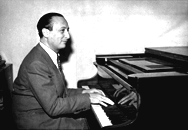
Szpilman's initial training as a pianist was in the Chopin School of Music in Warsaw under Josef Smidowicz and Aleksander Michalowski, both of them former students of Liszt. In 1931 he enrolled at the Akademie der Künste in Berlin, studying piano under two of the most distinguished players of the day, Arthur Schnabel and Leonid Kreuzer, and composition under Franz Schreker, the renowned composer of Der ferne Klang and other similarly successful operas. On his return to Poland in 1933 he formed a highly successful duo with the violinist Bronislaw Gimpel that formed the basis, 29 years later, of the Warsaw Piano Quintet, whose tours soon earned it a reputation as an ensemble of world standing; Szpilman played with the Quintet until 1986.
Szpilman's own early compositions include a violin concerto and a symphonic suite, The Life of Machines, and when the Nazis invaded he was engaged on a Concertino for piano and orchestra --- a jazz-flavoured, Gershwinesque piece remarkably good-natured for the circumstances of its origin. The score went with him from hiding-place to hiding-place before he had to sacrifice it to survival; he reconstructed it after the War. His light music was particularly successful: for decades the Poles sang tunes from his three musicals, 50---60 children's songs and 600-odd chansons as they went about the business of their daily lives.
A CD released in 1998 by the German label Alina (run by Szpilman's son, Andrzej) testifies to both his fluency as a composer and his excellence as a pianist --- and it includes an archive recording of that life-saving Chopin nocturne. Six more CDs of Szpilman as both performer and composer are scheduled for release in Poland in the autumn. With luck his last-minute fame as a writer will bring his music the wider currency he would have wished for it during his lifetime.
MARTIN ANDERSON
Wladyslaw Szpilman, pianist and composer, born 5.December.1911, Sosnowiec, Poland; married Halina Grzecznarowski, 2 sons; died Warsaw, 6 July 2000.

Boston Globe
The most disturbing and moving book of the year
has been Wladyslaw Szpilman's ''The Pianist,'' an account of his survival in and out of the Warsaw Ghetto that Szpilman wrote more than 50 years ago. The book was swiftly suppressed, but Szpilman's son discovered it and arranged for its international publication over the last few years. Szpilman lost his entire family, but he was repeatedly saved by others, particularly by other Polish musicians and music lovers who were not Jews; he also survived because of his own resourcefulness and resilience. One of the most dramatic episodes in the book comes when a Nazi officer spares Szpilman's life after the pianist plays a Chopin nocturne for him.
Boston Globe on 10/22/99.
THE GUARDIAN
Books of the year
For someone who consumes history on TV, Jeffrey Shandler's While America Watches was illuminating and complemented Peter Novick's provocative essay The Holocaust in American Life. Wladyslaw Szpilman's memoir of life and death in the Warsaw Ghetto, The Pianist, is a miniature masterpiece to set 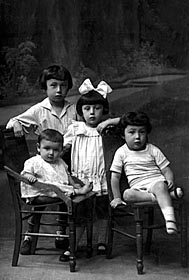 alongside Victor Klemperer's nightmare epic To the Bitter End, his diary of existence in Dresden 1942-45. I appreciated Suzanne Glass's thoughtful first novel, The Interpreter, and I am enjoying Gotham , by Edwin Burrows and Mike Wallace, a wonderful romp through New York's history. December 3, 1999 by David Cesarani
alongside Victor Klemperer's nightmare epic To the Bitter End, his diary of existence in Dresden 1942-45. I appreciated Suzanne Glass's thoughtful first novel, The Interpreter, and I am enjoying Gotham , by Edwin Burrows and Mike Wallace, a wonderful romp through New York's history. December 3, 1999 by David Cesarani
The Economist
Our reviewers' favourites
Our correspondents choose what they consider the finest of those published this year
THE PIANIST: SURVIVING THE HORROR OF WARSAW, 1939-45 By Wladyslaw Szpilman , Picador;
The last live broadcast on Polish radio in 1939, a piano piece played by Wladyslaw Szpilman, was interrupted by German shelling. The same pianist played the same piece when broadcasting resumed six years later. Mr Szpilman's account of the years in between is a tribute to the power of description and of music.
LIBRARY JOURNAL
Best Books of 1999
Since its inception in 1985, LJ's Best Books list has aimed to provide an end-of-the-year overview of the most interesting and important books the year had to offer. The list has averaged 30 to 35 titles, but this year -- as befits the end of the millennium -- it totals a grand 55. The Book Review editors found a wide range of books they were eager to share and noted some intriguing pairings: John Keegan's and Niall Ferguson's divergent studies of World War II, for instance, and novels by relative newcomers Diane Leslie and Frederick Reuss that look at the world from a child's cockeyed yet haunted perspective. With the rest of the list, these books represent a treat for every dedicated reader.
Szpilman, Wladyslaw. The Pianist: The Extraordinary True Story of One Man's Survival in Warsaw, 1939-1945. Picador: St. Martin's. ISBN 0-312-24415-0. $23.
Szpilman's memoir of life in the Warsaw ghetto is remarkable not only for the heroism of its protagonists but for the author's lack of bitterness, even optimism, in recounting the events. Written and published in a short run in Poland soon after the war, this first translation maintains a freshness of experience lacking in many later, more ruminative Holocaust memoirs. by Eric Bryant, Barbara Hoffert, Rebecca Miller, Nathan Ward, & Wilda Williams January 1, 2000
London - 3rd May 2000 - The judges of the annual Jewish Quarterly-Wingate Literary Prizes tonight awarded this year's Non Fiction Prize to Wladyslaw Szpilman for The Pianist (Phoenix / Golancz).
The decision was announced by author and broadcaster Frank Delaney, chairman of the judges, who had selected it earlier this evening from a shortlists of four titles:
"When you read this book - and you must read it - you will never forget it. The subtext asks whether good people were on the side of the evil people and shows how the human spirit is enlarged by the knowledge of such people."
Le Pianiste a été élu Meilleur livre de l'année 2001 par la rédaction du magazine Lire
Le Pianiste - Grand Prix des Lectrices de ELLE en 2002
Why has "The Pianist" been rediscovered now? Los Angeles Times 16.1.2000 (Click here to read the story)
"The Pianist" is remarkable for several reasons. First, as an eyewitness account of the destruction of the Jewish community in Warsaw, Szpilman's memoir is historically indispensable. Second, he writes with the grace and economy of a poet; there are no false notes. And third, his story is so incredible that it must be read to be believed... ...Here, in Wladyslaw Szpilman's "The Pianist," is a clear voice from a world that has vanished. We are fortunate to have him as a witness. THE WASHINGTON POST, 18.11.1999 (Read more)
The book is filled with unforgettable incidents, images and people. Its power derives from its immediacy but also from the deep reserves of culture the author was able to summon so soon after the war in an effort to make sense of it. Thanks to a new translation, American readers can now sample his artistry for themselves. THE WALL STREET JOURNAL, 2.9.1999 (Read more)
How a musician spent his six years between performances. Even by the standards set by Holocaust memoirs, this book is a stunner... SEATTLE WEEKLY, 7.10.1999 (Read more)
A Pianist´s War Notes: Wladyslaw Szpilman´s "The Pianist" chronicles the authors life from 1939 to 1945 in a matter-of-fact prose that is almost startling in its mundane telling of the horrific, terrifying events of Warld War II. FOX NEWS ONLINE, 15.10.1999 (Read more)
A stunning tribute to what one human being can endure, "The Pianist" is even more - a testimony to the redemptive power of fellow feeling. CLEVELAND PLAIN DEALER, 4.10.1999 (Read more)
''The Pianist'' is the diary of a season in hell... ...is a great book... ...It is easy to understand why the authorities suppressed ''The Pianist...'' THE BOSTON GLOBE, 21.9.1999 (Read more)
...this book will make readers look again at a history they thought they knew... PUBLISHER´S WEEKLY, Sept.99 (Read more)
With marked clarity and detachment, Szpilman takes us through the changing moods among the doomed population, moods determined by the merest whim or close calculations of the Germans. This is also a book about the power of music, which provides Szpilman the determination to go on and literally saves him several times. Several things distinguish this among Holocaust memoirs.Kirkus Review, Aug. 1999 (Read
more)
"I will never forgive myself that I was unable to do anything to save them..." - Wladyslaw Szpilman tells Anne Applebaum the extraordinary story of his survival in war-torn Warsaw. Evening Standard, 14.5.99 (Read more)
The last nocturne reprised by David Pryce-Jones THE TIMES LITERARY SUPLEMENT, 23/4/99 No 5012 (Read more)
The devil is in the details Sunday Times, April 25 1999 (Read more)
The Pianist, Wladyslaw Szpilman's memoir of his existence in Warsaw from 1939 to 1945, is a book so fresh and vivid, so heartbreaking, and so simply and beautifully written, that it manages to tell us the story of horrendous events as if for the first time. Sunday Telegraph 17.4.1999 (Read more)
"...compulsive reading." Sunday Telegraph, 11/4/99
"...powerful memoir..." THE TIMES, London, 8/4/99 (Read more)
"The Pianist is a work of a very high order in the literature of the Holocaust. Despite everything that happened to Szpilman - the loss of his family and most of his friends - it doesn´t contain even a hint of a desire for revenge..." (Peter Gilbert)Ham & High 9/4/99 (Read more)
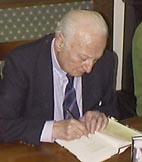
" ...the book offers a sense of future after Auschwitz, a future grounded in the promise of dialogue, of real relationships..." JEWISH CHRONICLE, 4/4/1999
..."the immediacy of Szpilman's account goes hand in hand with a rare tone of innocence." (Lisa Appignanesi) OBSERVER, 28/3/99 (Read more)
"... gripping, economic prose" INDEPENDENT ON SUNDAY, 28/3/99 (Read more)
They didn´t shoot the piano player - Interview with Wladyslaw Szpilman by Jay Rayner OBSERVER, 21/3/99 (Read more)
Karen Glaser meets an extraordinary soloist: the pianist whose vivid memoir of survival in wartime Warsaw is available in English after 50 years. JEWISH CHRONICLE, 19/03/99 (Read more)
...it is all told with a simple clarity that lodges the story in one's stomach through a mixture of disgust, terror, despair, rage and guilt that grips the reader almost gently." THE SPECTATOR, 5/3/99 (Read more)
"The images drawn are unusually sharp and clear, perhaps because this book was first written immediately after the war. But its moral tone is even more striking: Szpilman refuses to make a hero or a demon out of anyone." THE LITERARY REVIEW, 3/99
From the Abyss (Read more) by Rafael Scharf (Book Launch - Jewish Book Week London 14.3.99)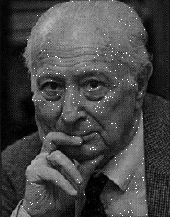
"Music tells Holocaust survivor's harrowing tale. Chopin's Nocturne in C Sharp minor played a major role in Wladyslaw Szpilman's life." THE PRESS, Christchurch, New Zealand 8/98 (Read more)
In tune with history
The Pianist book is a vivid look at occupied Poland Author's son worked years to get it published
Ha'aretz
A nocturne to life
By Michael Handelzalts
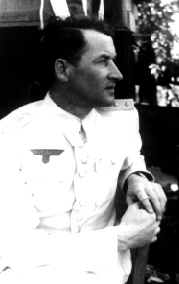 I heard the name of the pianist, Wladyslaw Szpilman, from my father, a Warsaw musician of Szpilman's generation who must certainly have heard his music and met him after the war. So, when I saw that his book, "The Pianist: The extraordinary true story of one man's survival in Warsaw, 1939-1945," came with a CD, I picked it up also because of its family musical connection. Yes, I listened to the music with much pleasure (it's a shame the particulars of the works are printed only on the CD itself); Szpilman was indeed an exciting pianist. On the CD accompanying the book, he plays Busoni's transcription of Bach's Chaconne, and Chopin, lots of Chopin - the mazurka, opus 17, no. 4, which my father often played, and the nocturne in C sharp minor...
I heard the name of the pianist, Wladyslaw Szpilman, from my father, a Warsaw musician of Szpilman's generation who must certainly have heard his music and met him after the war. So, when I saw that his book, "The Pianist: The extraordinary true story of one man's survival in Warsaw, 1939-1945," came with a CD, I picked it up also because of its family musical connection. Yes, I listened to the music with much pleasure (it's a shame the particulars of the works are printed only on the CD itself); Szpilman was indeed an exciting pianist. On the CD accompanying the book, he plays Busoni's transcription of Bach's Chaconne, and Chopin, lots of Chopin - the mazurka, opus 17, no. 4, which my father often played, and the nocturne in C sharp minor...
... The book and his story are a rare document, with a human significance that goes way beyond the boundaries of the period with which it deals, 1939-1945, or the place in which it all happened, Warsaw.
From the article by Ayelet Negev in Yedioth Ahronot, in which
she interviews Szpilman's son, Andrzej, I learned that Yad Vashem
refuses to recognize Hosenfeld, the German officer who saved Szpilman,
as one of "the righteous among the nations," fearing
he may have participated in the murder of Jews and despite solid
evidence that he, in fact, saved a number.
As a result, the hope expressed by Biermann, that Szpilman and
his son would plant a tree in the name of Hosenfeld along the
avenue of The Righteous Among the Nations at the Holocaust memorial
site cannot be realized.
Photo: Kpt. Wilm Hosenfeld in 1944
"It's the story I've been looking for for years..."
Polanski, the Once and Future Auteur
New York Times, 16.1.2000 (Read interview)
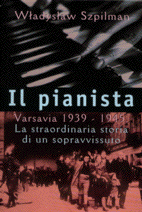
|
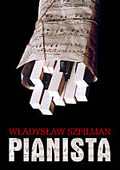
|
|
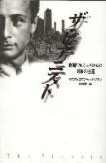
|
||
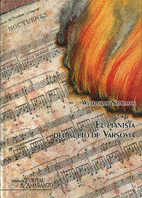
|
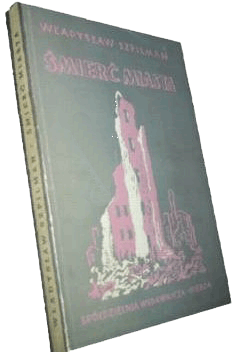
Death of the City Warsaw 1946 |
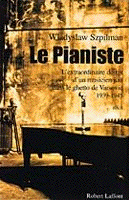
|
Interview with The President of Poland Mr.Aleksander Kwasniewski and The Prime Minister of Poland Mr. Leszek Miller on "The Pianist" (Windows Media Player)
A. J. Dabrowski: Przeglad Polski
Amazon.com customers reviews:
…A book that should be featured in the top 10 books to read!…
…This was one of the most thought provoking books I have ever read….
…Wladyslaw Szpilman's memoir 'The pianist' is spell binding. It was hard to put the book down, once I started reading it. I have already read it 3 times… …his book is a must read…
…this book will move you to tears…
…Truly, truly an unforgettable masterpiece...

 Click to buy this book from Amazon in:
Click to buy this book from Amazon in:
England USA France Japan Deutschland Sweden Finland Italy Poland
Le Pianiste
L’extraordinaire destin d’un musicien
juif dans le ghetto de varsovie, 1939-1945
de Wladyslaw Szpilman Editions Robert Laffont ![]()
Le Pianiste a été élu Meilleur livre de l'année 2001 par la rédaction du magazine Lire
Le Pianiste - Grand Prix des Lectrices de ELLE en 2002"Ce sont les mémoires, presque un journal, d'un pianiste polonais qui a vécu le ghetto de Varsovie et la destruction de la capitale. Il a aujourd'hui près de 90 ans et vit à Varsovie. Ce livre, écrit juste après la guerre, a été publié en Pologne à l'époque. Il évoque des faits historiques que le régime communiste préférait oublier et il n'a jamais été republié. Il y a un an, le fils de Wladyslaw Szpilman, qui vit en Allemagne, a découvert ce texte. Il n'en avait jamais discuté avec son père. On ne revenait pas sur ça. Pendant très longtemps, moi aussi, je parlais peu, voire pas du tout, de cette période. Le livre a donc été publié en Allemagne, et il a eu un énorme succès, public et critique. Il a tout de suite été repris par les Anglais et, il y a quelques mois, il a été édité aux États-Unis. En France, il sortira chez Laffont en décembre. Ce livre se lit comme un vrai thriller et, bien qu'il retrace une période noire de l'histoire, il est plein de forces positives et d'optimisme."
(Roman Polanski)
Polish Radio published the 5 CD´s box with recordigs of Wladyslaw Szpilman. Click on this link for more informations in Polish
On 26th October 2000 19.00 p.m. at the Gr eat Studio Concert Hall "W.Lutoslawski" of Polish Radio gala concert transmited by Polish Radio and TV stations with Polish artists: Ewa Bem, Anna Maria Jopek, Hanna Banaszak, Katarzyna Skrzynecka, Dorota Miskiewicz, Zbigniew Wodecki, Janusz Jozefowicz a.o.

Berlin, 20 May 2001
World Premiere of the Piano-Suite "The Life of the Machines" (1932) by Wladyslaw SzpilmanPerformed by Guenter HerzfeldCurt-Sachs-Hall Berlin Philharmony House
On April 29th, 2001 Peter Gimpel, Founder and Curator of the "Jakob and Bronislaw Gimpel Archives" writes:
"I am happy to give you the original manuscript of your father´s Suita for Piano, (a personal copy 1934 -as) inscribed by your father, Wladyslaw Szpilman to my father, Jakob Gimpel... I feel very privileged to have been able to contribute to the preservation of your father´s memory and work".
Los Angeles Times
Musically Mixed 'Reflections' on Holocaust
The Holocaust has become one of the most frequently invoked catalysts for composition in the 20th century--and now, beyond. It is also one of the most problematic. The risk of not doing justice to an event of such unbelievable horror must weigh like a heavy stone upon a composer's mind.And it is a loaded subject for the reviewer. No one questions the sincerity and commitment of the composers and performers, but sometimes you have to separate the subject matter from what your ears are telling you.Those challenges were present in the "Remembrances: Reflections on the Holocaust" program from conductor Noreen Green and the Los Angeles Jewish Symphony at Encino's Valley Beth Shalom on Sunday night--laudably ambitious in scope, serious in tone......The most memorable work was not a Holocaust piece per se. Rather, it was a Piano Concertino by Wladyslaw Szpilman (1911-2000), written in the Warsaw Getto in 1940 but never performed until Sunday night, with a remarkable 16-year-old pianist, Arthur Abadi, doing solo honors. Playing on a catchy four-note motif, the piece sounds like a European reaching across the sea to a fellow Jewish composer, George Gershwin, with bluesy, rhapsodic flourishes capped by a jazzy final chord... L.A.Times, May 1, 2001 By RICHARD S. GINELL

The Pianist, USA, Thorndike Macmillan Library Reference Large Print General Series, May 2000, ISBN 0786224207The Pianist, US: Picador USA, PB, September 2000. ISBN 0312-26376-7
The Pianist, Canada, Engl.: Mc Arthur & Co., 2000. ISBN 1-55278-142-9
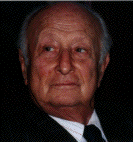 Download pictures of W. Szpilman for publications
Download pictures of W. Szpilman for publications 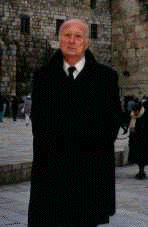
We have ca 40 000 visitors per month here. Thank you for coming.